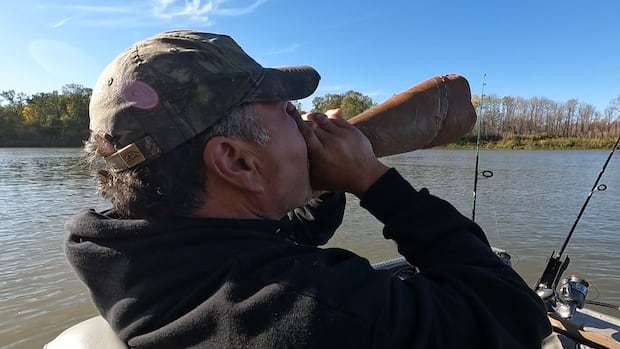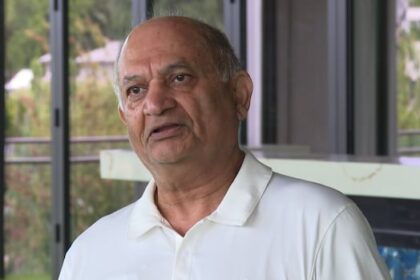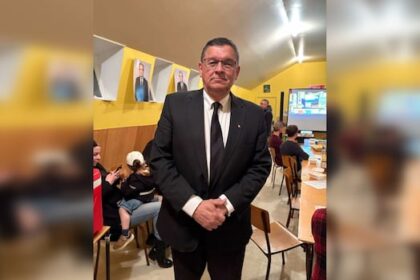Wayne Cook Sr. can still recall spotting about 10 bull moose along the river near his northern Manitoba community as he learned how to hunt as a child, but he feels lucky to see one nowadays.The 60-year-old says it used to be typical for him to harvest three to five moose a year in and around his community of Opaskwayak Cree Nation, about 525 kilometres northwest of Winnipeg, near the Saskatchewan border. That’s dropped to one.Once considered a staple food, moose meat has become a delicacy for the community, with an on-reserve population of 3,500, said Cook. He supports First Nations communities in Manitoba who have told licensed hunters not to harvest on their lands over the last couple years.”There’s got to be a limit,” Cook told CBC News in a Sept. 28 interview. “Some of these guys come in, and they expect [a moose] every year after that.”Cook, who has guided many licensed moose hunters from Manitoba, Saskatchewan and the United States through his First Nation, says habitat loss from nearby hydroelectric and mining projects, on top of this year’s devastating wildfire season, have largely driven moose away.”The hardest part of it is the sharing part,” he said. “We want to share, but there isn’t enough to share anymore — the sustainability isn’t there.”Wayne Cook Sr. says he supports First Nations in Manitoba that have told licensed hunters not to harvest on their lands over the last couple years. (Travis Golby/CBC)Omar Constant, a member of the Diamond Willow Traditional Hunting and Gathering Club in Opaskwayak — which hunts, fishes and gathers food to distribute throughout the community — says he’s seen the same moose decline in the last few decades.The club has had to become strategic and minimize how many moose it harvests along the river, he said, adding that conservation efforts must “come from within.””You have to think about the future,” Constant said. “What is my son going to hunt?”Cook’s and Constant’s concerns echo those raised by First Nations across the province.Manitoba made ‘political compromise’ by cutting moose draw licences in some areas, lawyer arguesPimicikamak Cree Nation calls on moose hunters to return licences, citing scarcity concernsMisipawistik Cree Nation in Manitoba’s Interlake region and Pimicikamak Cree Nation in the north are both currently involved in legal challenges against Manitoba’s issuance of moose hunting licences on their traditional territories.In August, Bloodvein First Nation in southeastern Manitoba put up signs warning licensed hunters to stay out of its traditional territory. The province later established a hunting buffer zone in between the community and nearby Berens River First Nation.The Manitoba Wildlife Federation — a conservation organization that represents the interests of Manitoba hunters — sent a letter to federal Minister of Public Safety Gary Anandasangaree on Wednesday, asking him to address Bloodvein’s “unlawful blockade,” which the federation says has prevented several licensed hunters from accessing public Crown lands.Chris Heald, a senior policy adviser at the wildlife federation, says the organization is considering legal action against the province over the Bloodvein situation.”We’re exploring all options with our legal team, and it is likely that we will be filing [something],” he said Thursday.’One escalation after another’The Manitoba Wildlife Federation also urged the province late last month to stop a limited moose harvest for Indigenous hunters in a section of western Manitoba this year, due to what it called a “plummeting” population despite a decade of hunting closures in the region.Treaty-based hunters and Métis harvesters have a constitutionally protected right of top priority to hunt, fish, trap and gather food, and they’re generally not subject to hunting seasons or bag limits.Manitoba awarded a total of 574 moose tags to hunters across 24 of the province’s 62 game hunting areas last year, a provincial spokesperson said.Fifteen game hunting areas are either completely or partially closed to moose hunters this year because of “lower than desired” population levels, according to Manitoba’s hunting guide.Indigenous leaders push back on calls to ban moose harvesting in parts of western ManitobaMisipawistik Cree Nation asks court to cancel some 2025 Manitoba moose hunting licencesIan Bushie, the natural resources minister for Manitoba’s NDP government, accused the former Progressive Conservative provincial government of failing to properly survey moose populations and of cutting funding.Bushie said his government believes all Manitobans should have the opportunity to hunt and is committed to protecting moose populations through science and strong partnerships.He said his department has met with “the licensed hunting communities and Indigenous leadership,” and will continue to consult as the province moves toward developing a joint conservation management framework to ensure “hunting traditions thrive for generations to come,” he said in a statement to CBC News.But the Manitoba Wildlife Federation’s Heald says the situation is “getting out of control,” and the province needs to get everyone on the same page sooner than later.”It’s just one escalation after another, and the resources … lose in the end,” he said.”We fully recognize the First Nations’ first right to the resource, [but] it’s not an exclusive right to the resource, and we feel there’s enough natural resources in Manitoba for all of us to share.”‘Build a relationship’Marc Kruse, the director of Indigenous legal learning and services at the University of Manitoba’s law school, says the situation is critical for Manitoba.”It can be an opportunity for reconciliation, or it’s an opportunity for division,” he told CBC News.The right to hunt for sustenance is one of the first and few Aboriginal rights to be “pretty settled” into Canadian law, he said. Canada has entered a new era he calls the “Indigenous renaissance,” where Indigenous nations assert their self-determination, sovereignty and treaty rights.Ignorance, racism or a lack of civics education can sway non-Indigenous Canadians to see those inherent rights as a “privileging of Indigenous peoples and their rights at the cost to them, which seems unfair,” Kruse said.”But that unfairness only comes because you don’t understand that … the treaties were sharing agreements, not land surrenders.”Marc Kruse, director of Indigenous legal learning and services at the University of Manitoba’s law school, says a ‘scarcity’ mentality is driving a wedge between Indigenous communities and licensed hunters in the province. (Amar Khoday/University of Manitoba)Licensed hunters also need to understand how sacred and important moose meat is for First Nations communities, he said.”I don’t know if the average Manitoban knows how difficult things are on First Nations,” said Kruse.”[Most] don’t have a grocery store that they can walk to and buy … safe and clean foods at reasonable prices like we can in our major cities.”Licensed hunters have more in common with Indigenous hunters than they might think, Kruse said, but declining moose populations have created a “scarcity” mentality that’s driving a wedge between the groups.”To me, that’s really a sign that the wildlife federation and other hunters haven’t really made meaningful attempts to build relationships with communities or to even really understand where they’re coming from,” he said.First Nation’s moose hunting case to make ‘new case law’ in Manitoba, lawyers say as hearings concludeHunting buffer zone near Bloodvein First Nation a ‘terrible precedent’: Manitoba Wildlife Federation”If hunters really want to hunt on these traditional territories, they ought to build a relationship with the community.”Heald called Kruse’s comments “a little disrespectful,” saying the wildlife federation does have partnerships with Indigenous communities and has been actively meeting with them to discuss moose hunting, though he said to protect their privacy, he declined to name which ones when asked by CBC News.
Thursday, 5 Mar 2026
Canada – The Illusion
Search
Have an existing account?
Sign In
© 2022 Foxiz News Network. Ruby Design Company. All Rights Reserved.
You May also Like
- More News:
- history
- Standing Bear Network
- John Gonzalez
- ᐊᔭᐦᑊ ayahp — It happened
- Creation
- Beneath the Water
- Olympic gold medal
- Jim Thorpe
- type O blood
- the bringer of life
- Raven
- Wás’agi
- NoiseCat
- 'Sugarcane'
- The rivers still sing
- ᑲᓂᐸᐏᐟ ᒪᐢᑿ
- ᐅᑳᐤ okâw — We remember
- ᐊᓂᓈᐯᐃᐧᐣ aninâpêwin — Truth
- This is what it means to be human.
- Nokoma











